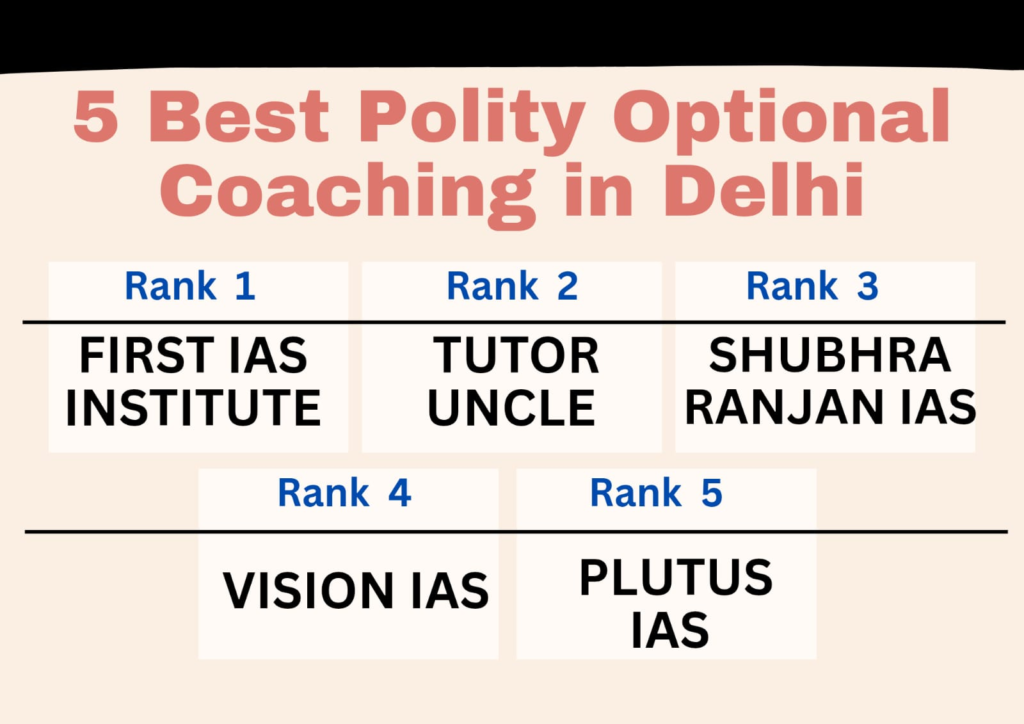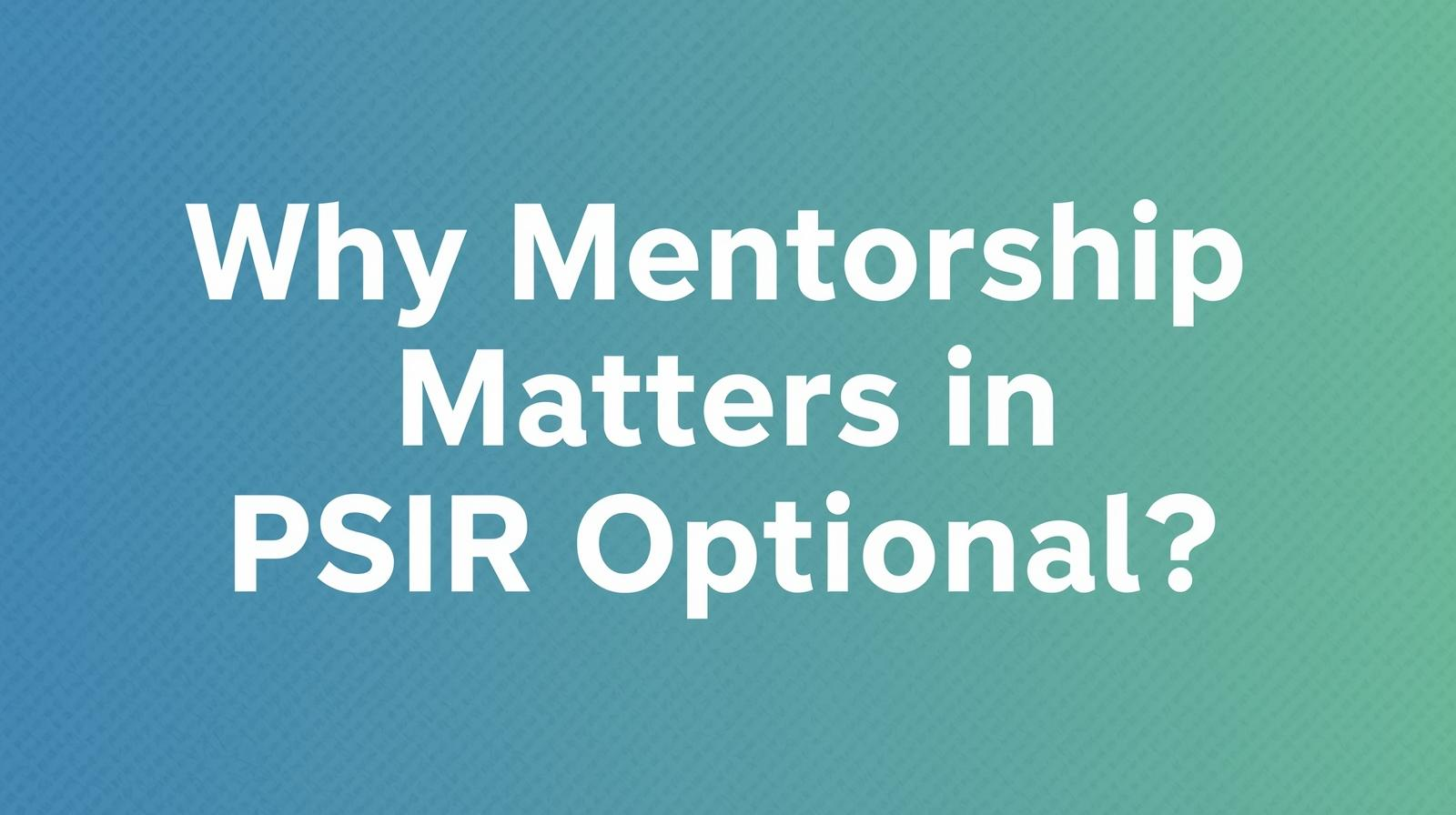Mentorship in PSIR optional is crucial because it provides personalized guidance that helps you navigate the vast syllabus, master the difficult art of analytical answer writing, and maintain motivation throughout the long UPSC journey. While books provide knowledge, a mentor provides the specific strategy and feedback needed to convert that knowledge into high scores.
Free Demo Class for PSIR Optional By – FIRST IAS INSTITUTE
The Challenge: Why PSIR is More Than Just Books
Many aspirants choose Political Science and International Relations (PSIR) for its significant overlap with General Studies and its reputation as a high-scoring optional. However, they soon discover that the path to a high score is filled with unique challenges that standard books or large coaching classes don’t always address.
The syllabus itself is a mix of static philosophy and dynamic global events.
The biggest hurdle, however, isn’t just knowing the content; it’s presenting it correctly. PSIR demands a specific style of academic, analytical answer writing, which is fundamentally different from the generalist answers required in GS. This is where most self-study students falter, possessing the knowledge but lacking the skill to articulate it effectively.
How a Mentor Bridges the Gap
A good mentor acts as your strategic partner, bridging the gap between simply studying the syllabus and actually meeting the examiner’s expectations.
Also Read: 5 Best Polity Optional Coaching in Delhi
Personalized Strategy and Syllabus Navigation
A one-size-fits-all study plan doesn’t work for UPSC. A mentor assesses your individual strengths, weaknesses, and academic background to create a tailored strategy. They help you:
- Prioritize topics based on their importance and your comfort level.
- Make interlinkages between different parts of the syllabus (e.g., connecting a political theory from Paper 1 to a foreign policy issue in Paper 2).
- Integrate current affairs analytically, teaching you how to use news events as examples to support theoretical arguments, not just as standalone facts.
Decoding the Art of PSIR Answer Writing
This is where a mentor’s value is most profound. Generic feedback in a large coaching class is often not enough. A mentor provides detailed, one-on-one feedback on your answers.
They teach you the critical differences between a GS and a PSIR answer. For example, on a question about the Governor’s role:
- A GS answer would focus on constitutional articles, recent controversies, and commission recommendations.
- A PSIR answer would do all of the above but also analyze the issue through the lens of federalism, quoting scholars like K.C. Wheare or Granville Austin, and situating it within the broader debate on the nature of the Indian state.
A mentor works with you to refine your answer structure, improve your argumentation, and teach you how to seamlessly integrate scholars and thinkers to substantiate your points.
Conceptual Clarity and Doubt Resolution
Struggling to understand Gramsci’s concept of hegemony or Rawls’ “veil of ignorance”? Reading a book multiple times might not help, but a five-minute conversation with a mentor can. They can simplify complex theories with relatable analogies and examples. Mentorship provides a safe space to ask fundamental questions and clear up nagging doubts that can otherwise hinder your progress.

Motivation and Accountability
The UPSC journey is a marathon, not a sprint. It’s long, isolating, and filled with moments of self-doubt. A mentor serves as a crucial support system. They’ve often been through the same process and can offer empathy and encouragement when you feel overwhelmed. Regular check-ins and deadlines also create a sense of accountability, ensuring you stay consistent with your study plan and answer writing practice.
Mentorship vs. Coaching vs. Self-Study
It’s helpful to see where mentorship fits in.
- Coaching: Excellent for initial syllabus coverage and providing structured material. However, due to large batch sizes, it often lacks the personalized feedback crucial for answer writing improvement.
- Self-Study: Offers flexibility but requires immense discipline. The biggest risk is practicing answer writing without expert feedback, which can ingrain incorrect habits that are hard to unlearn.
- Mentorship: Fills the critical gap. It’s the perfect supplement to either coaching or self-study, providing the personalized feedback that coaching misses and the expert guidance that self-study lacks.
Finding the Right Mentor
Finding a good mentor is key. Look for someone who has:
- Deep subject knowledge and a clear understanding of UPSC’s expectations.
- Experience with the process, such as a selected candidate or a seasoned teacher.
- Genuine interest in your progress and is accessible for doubt resolution and feedback.
- A teaching style that resonates with you. A good rapport is essential for a productive mentorship.
In conclusion, while the content of PSIR can be learned from books and lectures, the strategy, skills, and resilience required to score top marks are best cultivated under the personalized guidance of a mentor. They don’t just teach you the subject; they teach you how to succeed in the examination.

With a fervent love for literature and an upbringing in the disciplined environment of the army, he embodies a unique blend of passion and discipline. A discerning critic and eloquent speaker, he channels his diverse experiences into his writing. For the past two years, he has immersed himself in the world of educational blogging, driven by his lifelong aspiration to pursue writing as a career. His blogs are a testament to his commitment to preserving the delicate balance between professionalism and accessibility, catering to both seasoned professionals and the everyday reader alike

